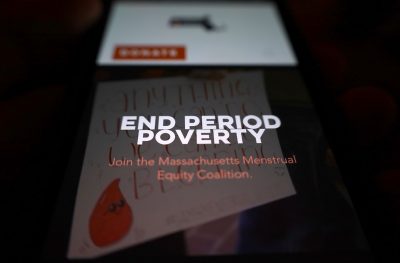Period poverty — defined as not being able to afford sanitary products — is a largely unpublicized social issue affecting individuals who menstruate in Boston and around the world.

According to the State of the Period report of 2021, almost a quarter of students in the United States say they struggle to access period products.
Lily Acton, a master’s of public health candidate at Boston University, is the co-president of the BU School of Public Health’s Period Project. On a larger societal scale, Acton emphasized that period poverty is the “inequitable access to menstrual products.”
Monica Onyango, a clinical associate professor at SPH, said that period poverty does not only impact underdeveloped countries — it is a global issue.
“There are specific demographics who have [been] affected by the issue of period poverty and those are poor women in the U.S., maybe in Boston,” Onyango said. “Just being able to understand who carries the greater burden of period poverty, that would be important, a good place to begin understanding the magnitude.”
Period poverty can also often result in gender-based violence. Onyango said in her work with populations of forcibly displaced refugees, she had encountered many young children who could not afford menstrual hygiene products.
“They get involved in transactional sex,” said Onyango. “They’re forced to be in situations where they have to compromise themselves to be able to afford sanitary menstrual hygiene materials.”
Acton said period poverty can have negative impacts on those who experience it, especially for students as it can disrupt education and become an burdensome financial pressure. She said having financial barriers to access menstrual products can also create a negative stigma over menstruation.
“It seems like this additional thing that people have to ask for,” Acton said. “Whereas if we were to provide them universally, it would be universally acknowledged that people menstruate and they need these products and it’s not some sort of luxury.”
Yeelin Bacchus, a senior in Sargent College of Health and Rehabilitation Sciences and social media coordinator for the student organization Period at BU, added that there are also clear ties to increased depression and anxiety that arise as a result of period poverty.
“[If] you don’t have access to the products that you need, you’re more likely to miss school, and then you’re more likely to experience depression, anxiety,” Bacchus said. “Obviously, I’m not saying causation here, but there is a correlation between these things.”
SPH’s Period Project started in 2019 when five master’s of public health students saw a need for greater access to menstrual products in all the bathrooms on campus, Acton said. The group was awarded Activist Bucks Grant from BU’s SPH, the group demonstrated a clear need for students to have unrestricted access to menstrual products.
“Fifteen percent of students at the School of Public Health and on the Medical Campus had missed part or all of a class because of a menstrual emergency,” Acton said.
The Period Project has successfully secured period products in every bathroom in the Talbot Building, which houses the School of Public Health. In the future, the group aims to expand their outreach, ensuring access to menstrual products in every bathroom on BU’s Medical Campus at large.
Period at BU has similar goals, and achieves them through three pillars of “service, advocacy and education,” said Richaa Kalva, a junior in the College of Engineering and the organization’s president.
Through discussion, Period at BU hopes to make people aware “that period poverty and menstrual justice is a public health issue,” Kalva said.
Kalva also added that Period at BU has also worked to educate BU students about important legislation intended to alleviate the effects of period poverty. The I Am Bill would ensure access to free menstrual products in prisons, homeless shelters and public schools in Massachusetts.
“We held a very similar drive last semester in Kilachand Hall and we collected over 700 period products and raised over $1,300,” Bacchus said.
Period at BU is currently hosting a drive collecting menstrual products until Nov. 20. Donation bins are set up in Warren Towers and Rich Hall, and the club is accepting donations via Venmo.
Kalva said she hopes more education on the subject will help others learn about the importance of the cause, which Period at BU has begun through spreading awareness on campus.
“In terms of what we can do here at BU, it’s having a more open dialogue about this, making it known as the real issue that it is,” Kalva said.


























































































































